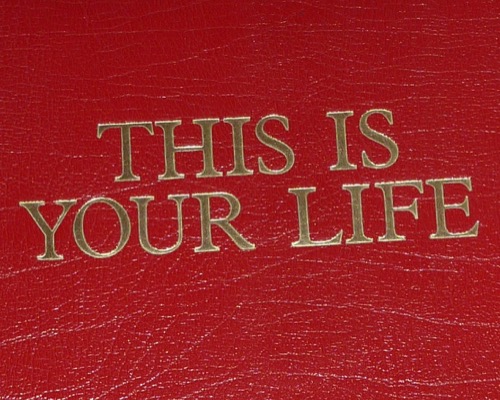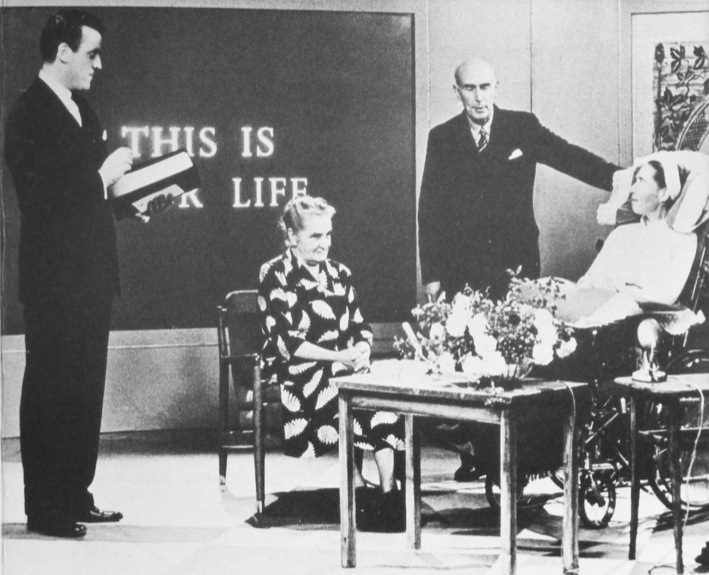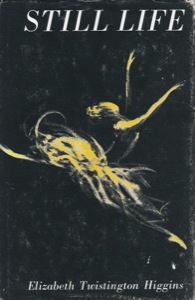Big Red Book
Celebrating television's This Is Your Life
Elizabeth TWISTINGTON HIGGINS (1923-1990)

THIS IS YOUR LIFE - Elizabeth Twistington Higgins, ballet teacher and artist, was surprised by Eamonn Andrews at the Middlesex Hospital in London.
Elizabeth trained with the Sadlers Wells Ballet School, and took dancing lessons with the Arts Educational Trust, where she later worked as a teacher. At the height of her career as a classical ballet dancer she was struck down by paralytic polio in 1953.
Totally immobilised, Elizabeth was confined to a wheelchair by day and slept in an iron lung by night. Despite being almost totally paralysed from the neck down, she established her own dance troupe and became a successful painter by mouth.
programme details...
- Edition No: 169
- Subject No: 170
- Broadcast live: Mon 6 Nov 1961
- Broadcast time: 7.55-8.30pm
- Venue: BBC Television Theatre
- Series: 7
- Edition: 6
on the guest list...
- Jean Young
- Pat Dainton
- Janet Hamilton-Smith
- John Hargreaves
- Pauline Grant
- Charles Readon
- George Bernard
- Bert Bernard
- Georgina Estelle
- Adrian Spratt
- Jennifer Ripley (nee Poynting)
- Rosemary Howard
- Gloria Lethern
- John Ripley
- Mr Wilson
- David Blair
- Beryl Grey
- Dr and Mrs Twistington Higgins - parents
- Phillipa Crews
- Margaret Crews (nee Roseby) Filmed tribute:
- Claire Bloom
production team...
- Researcher: Nickola Sterne
- Writer: Nickola Sterne
- Director: Yvonne Littlewood
- Producer: T Leslie Jackson
- names above in bold indicate subjects of This Is Your Life
from ballet to ballroom
Elizabeth Twistington Higgins: This Is Your Life
A profile of the ballet dancer

Elizabeth Twistington Higgins and guests on This Is Your Life

My birthday in 1961 is firmly etched in my memory. I was asked by the BBC to appear in ‘Town and Around’, a daily magazine programme about the South East of England. When they suggested that I went to London for the interview, I was a bit suspicious. In normal circumstances, a mobile camera team would have come to Dover. My suspicions were well-founded; this was only a ruse to get me to appear on the weekly programme This Is Your Life, which gave a glimpse into the lives of celebrated or interesting people. I was amazed that they should consider me a suitable subject.
An appearance on This Is Your Life was supposed to come as a complete surprise, but my doctor had advised the producer not to spring a sudden shock on me. I was shocked. I burst into tears. I felt I could not face my friends and relations saying kind and flattering things about me for half an hour. Overwhelming kindness always upset me.
I told Matron I could not do it. She seemed very disappointed but I think she understood. I was glad she was the only person who witnessed my emotional outburst. She left, saying that the decision was entirely up to me; I was to think it over and let her know in the morning.
This bombshell interrupted a painting lesson with Rosemary and had completely shattered my powers of concentration. There was no more work that afternoon.
I discovered that Rosemary was already in on the secret, and she spent the rest of the afternoon calming me down. She told me that, of the four lives prepared for the following week, three had left the country. If I did not appear, the programme would either have to be cancelled or a repeat performance shown. She was very persuasive. I felt I could not let everyone down and accepted the challenge, though reluctantly. I had accepted challenges before, but this one scared me stiff. In the theatre, I would have given my bottom dollar for this kind of publicity. Now I was in a wheelchair. I did not want to appear before an audience.
The nurses knew that something was troubling me but, as I was under a vow of silence, it was impossible for me to communicate with them. I could not eat or sleep or concentrate; my thoughts were focused entirely on the ordeal ahead. My mind was so preoccupied that I never even thought of buying anything special to wear on this great occasion. Looking back, I am still amazed at myself – it was so unlike me. I felt sick with anxiety and nerves and the next four days seemed endless.
On the fifth of November, I was formally admitted to the Observation Ward of the Middlesex Hospital in London. Here too, secrecy prevailed and I was obviously a rather mysterious patient. I was under the care of the RMO, and his young Houseman thought I was an interesting case. After asking me a lot of questions about my illness, he looked incredulously at me and said, ‘You’re a living miracle!’
This was his first meeting with someone who had had respiratory polio.
Early the next morning, the BBC took possession of my room. Everything was moved out of the way; cameras brought in, cables laid, lights fixed, sound tested; the interviewer, Nancy Wise, came in and we were on the air.
The conversation that followed was spontaneous and went off quite well, apart from one rather awkward moment.
‘Do you miss the world of ballet?’
For a second I was completely taken aback by such an obvious query, and sharply retorted,
‘Of course I do!’
This was not very polite of me and Nancy must have felt terrible having asked such a tactless question. I have always been a volatile and emotional person. If only I could react more slowly and had greater control over my emotions, I would so often save others from being hurt and embarrassed.
At the end of the interview, Nancy said to me, ‘As it is your birthday Elizabeth, the BBC has prepared a surprise for you.’
She turned to face the door and in walked Eamonn Andrews.
After a few words of greeting, he asked me if I would come to the Television Theatre that evening and see what other surprises the BBC had in store for me.
I spent the afternoon resting in my respirator. I was being washed and dressed for the evening performance when our pre-recorded interview was shown in ‘Town and Around’. I did not see myself, nor did I hear Eamonn Andrews say that, for the first time they were breaking the usual rule of silence for the evening’s performance of ‘This Is Your Life’. Owing to my disabilities, it had been decided to warn me beforehand that I would be appearing.
The RMO came in to see that I was feeling all right before I set off in the ambulance for the theatre. We got there with five minutes to spare. Fortunately, I did not know we were cutting it as fine as this, or I would have been in a terrible state.
I was backed down a ramp directly on to stage level. There, one of my dancing partners from Song of Norway greeted me and gave me a birthday present – the first and only one that day. I only appreciated the thoughtfulness of this gesture when everything was over.
The atmosphere in the theatre was tense. I was acutely aware that everyone was willing me to give my best. Everywhere I looked, there were stage hands at the ready; I saw oxygen in the wings in case of emergency, but no guests.
I was pushed into position on the stage behind a table bearing microphones, a bowl of pink carnations and a whirring fan. The make-up girl stepped forward and powered my face. My white pillow slips were changes for blue ones. As the programme was timed to the final second, Eamonn said he would prefer me to keep quiet! He was still talking to me as the signature tune started. I was quite unaware that there had been any warning – Eamonn disappeared through the curtains and we were on!
I heard him say, ‘Tonight, This Is Your Life is a birthday party, with birthday surprises for one of the most remarkable and courageous ladies I have ever met.’
The curtains parted and I found myself facing a theatre full of people. I was back on stage!
As the applause died away, I heard the music of Les Sylphides and, on a monitor set, I saw some children dancing the Nocturne from this lovely ballet. They were pupils from the Cone School and were the first of my guests.
The others followed in quick succession: Jean Young, an Associate Member of the Royal Academy, recalled her memories of my dancing; Pat Dainton, one of my most talented and industrious pupils, remembered me as her teacher, as did Claire Bloom in a tele-recorded message from Hollywood.
The music of Song of Norway heralded the entrance of singers Janet Hamilton-Smith and John Hargreaves, followed by Pauline Grant, the choreographer for whom I worked so often; Charles Reardon, the stage doorkeeper, reviving happy memories of the time I spent at the Palace Theatre; the sound of squabbling off-stage, and the rushed entries of the Bernard Brothers dressed as Cinderella’s ugly sisters – memories of the pantomime at the London Palladium.
Following my theatre colleagues, two children I used to teach at Coram’s Fields. Then on to the present. Jenny and John Ripley; Rosemary Howard and one of her pupils who had modelled for me; Leslie Wilson, representing the Medici Galleries: David Blair and Beryl Grey from the Royal Ballet; my mother and father and finally, Margaret Roseby, also from the Royal Ballet, and her daughter. Eamonn presented me with the script and the curtain fell. The half hour had passed swiftly and pleasantly and I had enjoyed it after all.
This was the last I saw of Eamonn as he had to fly to Ireland immediately after the show. I felt slightly disappointed that he was unable to be with us, but suddenly, my sister Brighid and her husband were on the stage beside me. Unknown to me, they had been in the audience. They too were invited to the party held specially for all who had taken part in the programme. Here I met the production crew and was at last able to chat with my guests.
By eleven o’clock I was absolutely whacked. My thanks to everyone were completely inadequate – I was far too tired and breathless.
The RMO greeted me on my return. He told me he had watched the programme with interest and with a degree of clinical concern. He could tell by the rapid movement of my neck muscles that I was exceedingly nervous, and that it took a good ten minutes for my respiration rate to return to normal.
The Houseman offered to help the nurses put me to bed. In spite of my exhaustion, his thoughtfulness amused and delighted me and I was quite disappointed when they said they could manage without him!
It was well after midnight before I was settled in my cuirass, but I was far too keyed up to sleep. The past few days had been such an emotional strain that it was to take nearly a week for me to unwind. Thoughts raced through my brain, and sleep, which is always elusive, escaped me altogether.
I returned to Dover Isolation Hospital two days later. Travelling in a hearse-like Daimler ambulance, I felt I was very much on view. All along the route, people recognised me; they stood up in the buses and along the streets, waving as I passed. I was staggered to think that my brief appearance on television had brought this publicity. The nurse beside me acknowledged these friendly greetings. She became quite tired waving continuously on my behalf, and said she wouldn’t be the Queen for anything!
Gradually, I learned a little more about the preparations for the programme. I had not been the only one who had suffered agonies of nerves. My guests had been rehearsed for two days and had had to learn a script. Some of them were professionals and no doubt took it in their stride, but the others were unused to appearing in public and found it a terrible ordeal. Most of them were seeing me disabled for the first time and must have been shocked by what had happened to me. This must have added to their strain and I knew how I would have felt in their place. I think they were very plucky to appear in the show.
The most trying moment for me had been the appearance of my parents. I very nearly broke down. My heart ached with sympathy for them; I knew what it was costing them to stand up in public and make their speeches. By nature, they were reserved and retiring and, considering we had faced a live audience in the theatre as well as approximately fifteen million viewers, it was no wonder my poor mother got het up during rehearsals and felt she would never learn her lines. At one stage she even forgot which of her children she was talking about.
The producer, Leslie Jackson, a sensitive, very persuasive Irishman with several years’ practice at overcoming people’s diffidence and immediate reaction to a public appearance, must have had an awful time with my family. Whichever member he phoned, they all gave him the same answer, ‘Good gracious! You’ll never get them to do that!’
I learnt later that my father told him he would walk round the garden until the show was over!
There must be a story behind the life of every disabled person. That mine was chosen to be shown on television was for its visual appeal, and because it was easy for people to realise the enormous change from dancing on stage to a life of immobility in a wheelchair. There was no doubt at all that the public’s imagination had been captured. Not only those leading a normal life, but disabled people too, known and unknown, wrote to me. The programme, they said, had been inspiring and encouraged them to new efforts. I was surprised and felt very humble. It had never occurred to me that my struggles to paint could have helped others in this way. It was one of the unexpected rewards. The other came a few weeks later. A special despatch rider drove up to the hospital with an enormous red morocco-bound book of photographs – a wonderful souvenir of an unusual and very happy birthday.
Series 7 subjects
Max Bygraves | Mario Borrelli | Alastair Pearson | Brian Rix | Derek Dooley | Elizabeth Twistington Higgins | Sandy MacPhersonRonald Menday | Harry Day | Peter Finch | Charlie Drake | Timothy Cain | Isabella Woodford | David Park | Sefton Delmer
Coco the Clown | Jenny Gleed | Arthur E Davies | Tom Evans | David Pelham James | Kenneth Horne | Marie Rambert | David Butler
Glen Moody | Kenneth Cooke | Tom Breaks | Dora Bryan | Bob Oatway | Acker Bilk | Hester Meakin | Joe Filliston | Ellaline Terriss